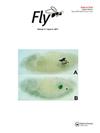Mobile-phone radiation-induced perturbation of gene-expression profiling, redox equilibrium and sporadic-apoptosis control in the ovary of Drosophila melanogaster
IF 2.4
4区 生物学
Q3 BIOCHEMISTRY & MOLECULAR BIOLOGY
引用次数: 15
Abstract
ABSTRACT The daily use by people of wireless communication devices has increased exponentially in the last decade, begetting concerns regarding its potential health hazards. Drosophila melanogaster four days-old adult female flies were exposed for 30 min to radiation emitted by a commercial mobile phone at a SAR of 0.15 W/kg and a SAE of 270 J/kg. ROS levels and apoptotic follicles were assayed in parallel with a genome-wide microarrays analysis. ROS cellular contents were found to increase by 1.6-fold (x), immediately after the end of exposure, in follicles of pre-choriogenic stages (germarium - stage 10), while sporadically generated apoptotic follicles (germarium 2b and stages 7–9) presented with an averaged 2x upregulation in their sub-population mass, 4 h after fly's irradiation with mobile device. Microarray analysis revealed 168 genes being differentially expressed, 2 h post-exposure, in response to radiofrequency (RF) electromagnetic field-radiation exposure (≥1.25x, P < 0.05) and associated with multiple and critical biological processes, such as basic metabolism and cellular subroutines related to stress response and apoptotic death. Exposure of adult flies to mobile-phone radiation for 30 min has an immediate impact on ROS production in animal's ovary, which seems to cause a global, systemic and non-targeted transcriptional reprogramming of gene expression, 2 h post-exposure, being finally followed by induction of apoptosis 4 h after the end of exposure. Conclusively, this unique type of pulsed radiation, mainly being derived from daily used mobile phones, seems capable of mobilizing critical cytopathic mechanisms, and altering fundamental genetic programs and networks in D. melanogaster.手机辐射对黑腹果蝇卵巢基因表达谱、氧化还原平衡和散发性细胞凋亡控制的干扰
近十年来,人们对无线通信设备的日常使用呈指数级增长,引起了人们对其潜在健康危害的关注。将4天大的黑腹果蝇成年雌蝇暴露在商用手机辐射下30分钟,SAR为0.15 W/kg, SAE为270 J/kg。ROS水平和凋亡卵泡与全基因组微阵列分析并行测定。暴露结束后,在绒毛膜前阶段(胚囊- 10期)的卵泡中,ROS细胞含量增加了1.6倍(x),而在移动设备照射后4小时,偶有凋亡的卵泡(胚囊2b和7-9期)的亚群质量平均上调了2倍。微阵列分析显示,168个基因在暴露于射频(RF)电磁场辐射2小时后出现差异表达(≥1.25倍,P < 0.05),并与多种关键生物过程相关,如与应激反应和凋亡相关的基础代谢和细胞子程序。将成年果蝇暴露于手机辐射30分钟后,会立即影响动物卵巢中ROS的产生,这似乎会在暴露后2小时引起基因表达的全局、系统性和非靶向转录重编程,最终在暴露结束后4小时诱导细胞凋亡。最后,这种独特的脉冲辐射,主要来自日常使用的手机,似乎能够调动关键的细胞病变机制,并改变黑腹龙的基本遗传程序和网络。
本文章由计算机程序翻译,如有差异,请以英文原文为准。
求助全文
约1分钟内获得全文
求助全文
来源期刊

Fly
生物-生化与分子生物学
CiteScore
2.90
自引率
0.00%
发文量
17
审稿时长
>12 weeks
期刊介绍:
Fly is the first international peer-reviewed journal to focus on Drosophila research. Fly covers a broad range of biological sub-disciplines, ranging from developmental biology and organogenesis to sensory neurobiology, circadian rhythm and learning and memory, to sex determination, evolutionary biology and speciation. We strive to become the “to go” resource for every researcher working with Drosophila by providing a forum where the specific interests of the Drosophila community can be discussed. With the advance of molecular technologies that enable researchers to manipulate genes and their functions in many other organisms, Fly is now also publishing papers that use other insect model systems used to investigate important biological questions.
Fly offers a variety of papers, including Original Research Articles, Methods and Technical Advances, Brief Communications, Reviews and Meeting Reports. In addition, Fly also features two unconventional types of contributions, Counterpoints and Extra View articles. Counterpoints are opinion pieces that critically discuss controversial papers questioning current paradigms, whether justified or not. Extra View articles, which generally are solicited by Fly editors, provide authors of important forthcoming papers published elsewhere an opportunity to expand on their original findings and discuss the broader impact of their discovery. Extra View authors are strongly encouraged to complement their published observations with additional data not included in the original paper or acquired subsequently.
 求助内容:
求助内容: 应助结果提醒方式:
应助结果提醒方式:


